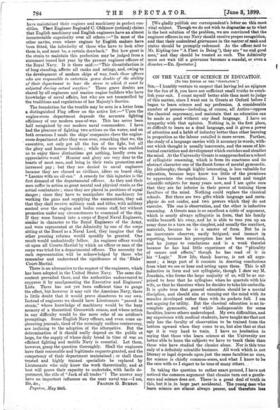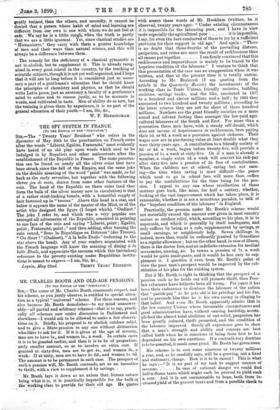ON THE VALUE OF SCIENCE IN EDUCATION.
[TO THE 4DITOB OF THE " SP,ECTATOR.1 SIR,—I humbly venture to suspect that having led an epigram for the fun of it, you have not sufficient small truths to estab- lish your suit., I count myself better able than most to judge of this matter, since I went out in Greats at Oxford before I began to learn science and my profession. A considerable number of persons—including, of course, all Antics--:--Oppose the classical supremacy, and maintain that an education can be made as good without any dead language. I have no sympathy with that opinion. Nothing is, in the first place, so difficult to learn as a dead language, and it gives a power of attention and a habit of industry better than other learning in propoition as the labour entailed is more severe. Further, the study of a language carries with it accuracy in words, with- out which thought is usually inaccurate, and the sense of his- torical conviction and development which enriches and steadies the mind. At the University Greats is unapproached as a school of syllogistic reasoning, which is from its exactness and its abstract character one of the finest forms of mental gymnastic. Its philosophy, though highly interesting, is less valuable for education, because boys know too little of the iiremisses to- appreciate the conclusions. I have learnt and . taught scientific subjects for many years now, and I "am quite sure that they are far inferior in their power of training these faculties of the mind. Nothing could replace the classical schools. But there are two gifts which language and _meta- physic do not confer, and two powers which they 'do not exercise. The one is observation, and the .Other is inductive reasoning. A Greats man is so excellent a critic of argument, which is- nearly always syllogistic in form, that his family writhe beneath his sway, and he, is able to toss you up an essay done to a turn on the simplest, arid usually the Scantiest, materials, because he . is a master of form. But he is an inaccurate observer, easily fatigued; and inexact in reporting, because his perception has- not been exercised, and he jumps to conclusions and is a weak theorist because he has had little experience of the " plurality of causes and effects," though he has read of it - in his " Logic." Now life, thank heaven, is not all argu- ment ; a large part of it consists in drawing conclusions from what we see or hear and acting upon them. This is all inductive in forni and not syllogistic, though I dire say M. Jourdain, who forms the large majority of us, will be as sur- prised to hear that he syllogises when he quarrels With his wife, as that he theorises when he decides to take his umbrella- It is quite true that general education should be a mental discipline, and should aim at turning out the mind with its muscles developed rather than with its pockets full. I am not arguing for utility. But the classical education is an in- complete gymnastic, and • while indispensable for some faculties, leaves others undeveloped.. My own difficulties, and my experience with medical student's, have taught tile-that not only has the faculty of observation to be trained from the bottom upward when they come to us, but also that at that age it is very hard to train. I have no hesitation in saying that those who learn science at the University- are better able to learn the subjects We have tO teach:them than those who have studied the classics alone. Nor is.this true only of a definitely scientific business. All work which is., not literary or legal depends upon just the same faculties as ours, for science is chiefly common-sense, and what I know.to be the ctise with us I' expect' to be true of many others. '
In taking the queStion to rather exact ground, I have not noticed the common argument that classics turn out a gentle- man and science does not. Them. is a great deal of truth in this, but in large part accidental. The young inen- who learn science are almost always - poorer, and therefore less gently trained, than the others, and secondly, it cannot be denied that a person whose habit of mind and learning are different from ' our own is. one with whom we do not feel at eaie. We say is a little rough, when the tfuth is partly that we are • a little ignorant. Yet, since clasiical studies are " Elumaniores," they • carry with, them' a greater knowledge of .men and their ways than natural science, and this will always be a difference between them. •• • The remedy for the deficiency of a classical gymnastic is not to abolish, but to supplement it. This is already recog- nised •in every good school in the country, by the teaching of scientific subjects, though it is not yet well organised, and I hope that it will not be long before it is considered just as neces- sary a part of a gentleman's education that he should know the principles of chemistry and physics, as that he should write Latin prose, just as necessary a faculty of a gentleman's mind to notice and to reason justly, as to be accurate in words, and cultivated in taste. Men of ability do so now, but the training is given them by experience, it is no part of the general education of their youth.—I am, Sir, &c., W. P. HERRINGHAM.







































 Previous page
Previous page